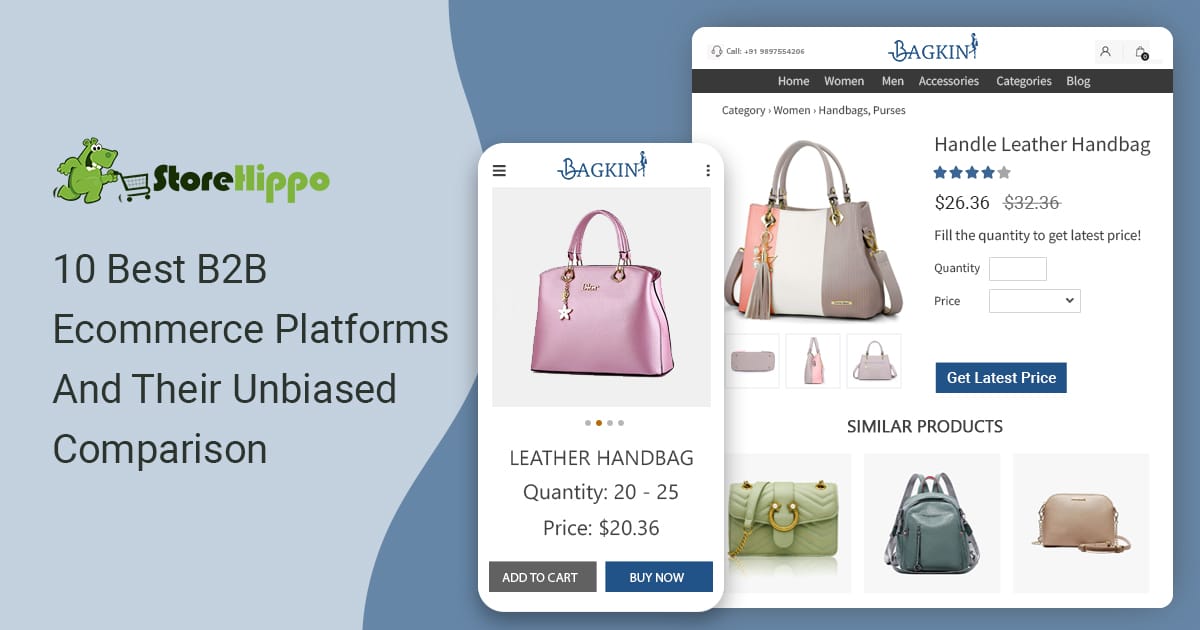With B2B ecommerce projected to be worth $20.9 trillion by 2027, this is the most opportune time for enterprise brands to build their own B2B ecommerce software solutions. However, choosing the right B2B ecommerce platform for their requirements needs to be a well thought decision that helps brands to stay in tune with the latest B2B trends.
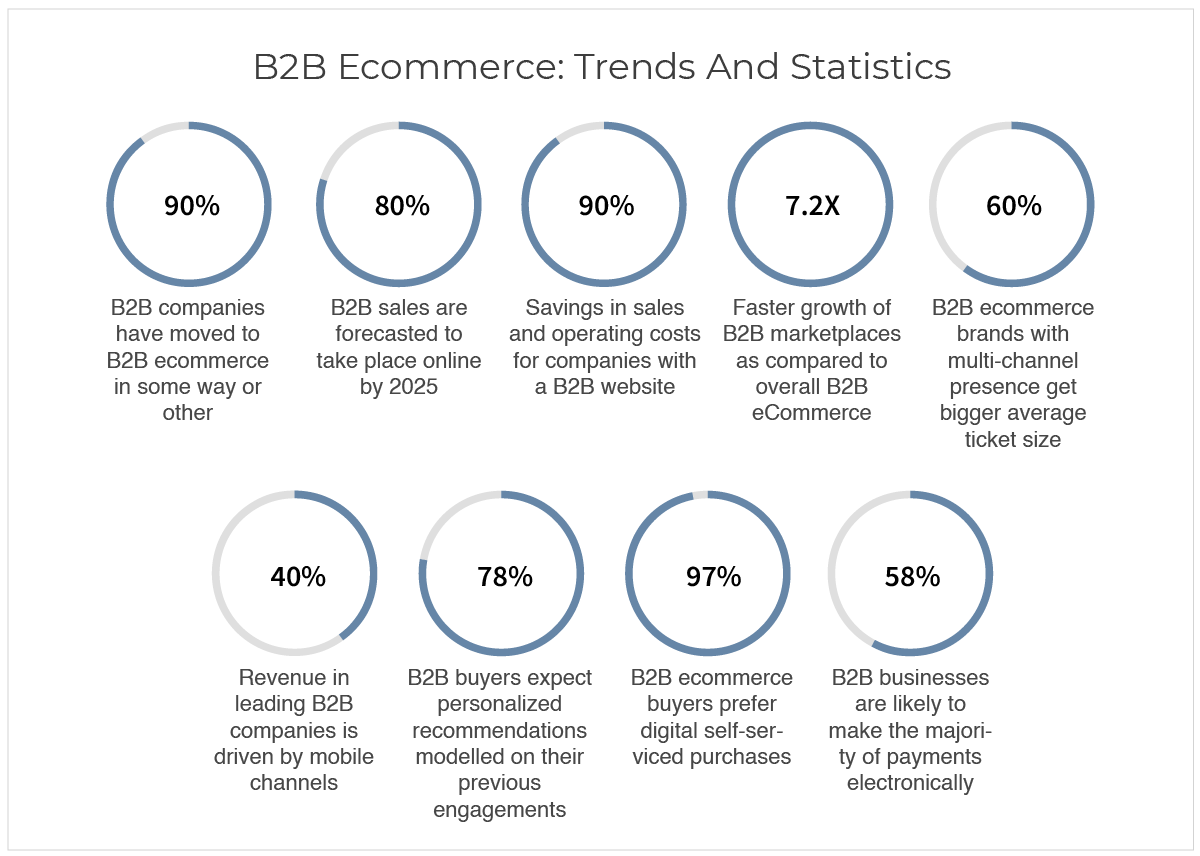
- 90% + of B2B companies have moved to B2B ecommerce in some way or other
- 80% of business-to-business sales are forecasted to take place online by 2025
- 90% savings in sales and operating costs for companies with a B2B website
- 7.2X faster growth of B2B marketplaces as compared to overall B2B eCommerce
- 60% of B2B ecommerce brands with multi-channel presence get bigger average ticket size
- 40% of revenue in leading B2B companies is driven by mobile channels
- 78% of B2B buyers expect personalized recommendations modeled on their previous engagements
- 97% of B2B ecommerce buyers prefer digital self-serviced purchases
- 58% of B2B businesses are likely to make the majority of payments electronically
Source: 360 Digital Commerce,McKinsey & Company, Statista, Accenture
To offer multi-channel, connected, personalized and seamless, self-serviced buying experiences to their customers, business-to-business enterprises need an ecommerce platform that not only builds tailor-made solutions but also helps them go-to-market quickly.
Also, modern Business-to-Business ecommerce solutions should come equipped to handle the current requirements of the enterprises as well as equip them with features and tools to implement the latest B2B trends.
In this blog, we bring an unbiased comparison of the 10 best B2B ecommerce platforms to help B2B brands decide the best one for their business.
Table of Contents
10 Best B2B Ecommerce Platforms For 2023
In this article, we are going to compare the following B2B ecommerce platforms:
- StoreHippo
- BigCommerce
- Magento Commerce
- Shopify Plus
- NetSuite
- SAP Commerce Cloud
- IBM Digital Commerce
- OpenCart
- 3dcart
- TradeGecko
Before we go into details of each platform let us first explain how you can choose the best fit solution for your brand. For making an informed decision, you will have to evaluate your selected B2B ecommerce solutions on the following parameters:
- 1st- how your B2B solution provider helps you implement various features to engage, convert and retain your buyers,
- 2nd- how the platform aligns with your organizational goals and helps you achieve them.
Let us begin by checking the must-have B2B features in your ecommerce platform.
Must-have features of a B2B Ecommerce Platform
While each B2B ecommerce platform has its own set of features and tools to offer, the best wholesale ecommerce platforms should have some common features. Let us check out the most important features needed in a B2B ecommerce platform and software:
Features to automate and shorten the sales cycle
B2B buying is not as simple as B2C sales processes. There are multi-level negotiations and many decision-makers. This makes the sales process longer and more complex than a typical B2C buyer journey.
Automating the process with features like RFQ, Minimum Order Quantity (MOQ), custom forms for gathering requirements etc. goes a long way in streamlining and shortening the B2B sales cycle.
Customized pricing and payment options
B2B pricing is driven by a lot of factors like geography, taxation, order volume, customer loyalty and more. Also, B2B payment is very different from B2C and involves a different payment cycle altogether where clients may make the full and final payment after a certain period.
Your B2B ecommerce platform should be equipped with a variety of payment methods for a diverse clientele. Also, you should have the option to offer personalized pricing to your buyers. This becomes even more important for B2B ecommerce brands that have also diversified into D2C selling.
Your B2B ecommerce solution should have features to implement different pricing for different customer groups and hide the wholesale prices from the retail buyers as well.
Ability to restrict access for different customer and user groups
In a business-to-business setup, you have different sets of clients. The deals, offers and prices for one group are usually not disclosed to the other. Similarly, you might want to restrict access of unregistered customers to your products and pricing. Your B2B ecommerce solution should have inbuilt features to restrict access at different levels.
Even at the organizational level, your B2B ecommerce software should be equipped with features that help you define user roles for granular security. There should also be inbuilt tools for audit-log so you can check, control and revert damages wherever possible.
Personalized and memorable customer experiences
Modern B2B ecommerce buyers expect the same ease of buying and enjoyable experiences as their B2C counterparts. Your B2B ecommerce website can no longer be boring and dull.
Look for a B2B ecommerce platform that gives you customizable device optimized themes, allows you to make quick changes to your themes, implement different themes for different user groups, geographies, devices etc., lets you add detailed product images and videos, enables your buyers to raise a request directly from the product page and add their reviews as well.
Your B2B ecommerce platform should also have the feature to personalize your buyers’ journey in their preferred language. Personalization can go a few notches higher with multi-currency buying options, customized invoices and personalized discount features in your B2B ecommerce platform. Also, look for a B2B ecommerce software that is brandable.
Flexibility to build innovative solutions
The ecommerce market is changing like never before and so are the business models. To cope with the changing market and buyer demands your B2B ecommerce platform should have the flexibility and agility to adapt to changing market requirements.
Look for a B2B ecommerce software that comes with inbuilt solutions for a variety of business models like multi vendor B2B marketplace, location-based multi-store ecommerce, multilingual B2B website, ability to add D2C sales channel, go omnichannel and connect with customers on their preferred touchpoints.
A B2B ecommerce suited for modern markets and customers needs the flexibility to be easily customizable and integrated with diverse tools and software to build a cutting-edge B2B website for your brand.
Things to consider before finalizing your B2B ecommerce platform
To ensure that your B2B ecommerce platform also helps your organization perform more efficiently check if it has the following features:
- It is user-friendly with an intuitive admin interface
- A smooth learning curve even for employees with basic computer or IT knowledge
- Tweakable existing entities/modules to suit the unique needs of your B2B brand
- The B2B ecommerce platform is not only aligned with your current business needs but also gives a future-ready solution for your brand
- Seamless integrations with your chosen ERP, CRM, POS, accounting, taxation or any other software or service provider of your choice
- Whether your B2B ecommerce platform has built-in features or would you need additional paid apps and extensions to carry out your business processes
- The transparent pricing structure and how well it is aligned with different stages of your growing business ( also check for hidden costs if any)
- Support, automatic maintenance and upgrades or will you have to take care of any of these aspects of your B2B ecommerce software
10 Best B2B Ecommerce Platforms: A Detailed Comparison
Now that you are clear about what to look for in your B2B ecommerce software providers, we bring you a list of the top 10 B2B ecommerce platforms. We have chosen these platforms based on the inclusion of B2B features listed above.
1. StoreHippo
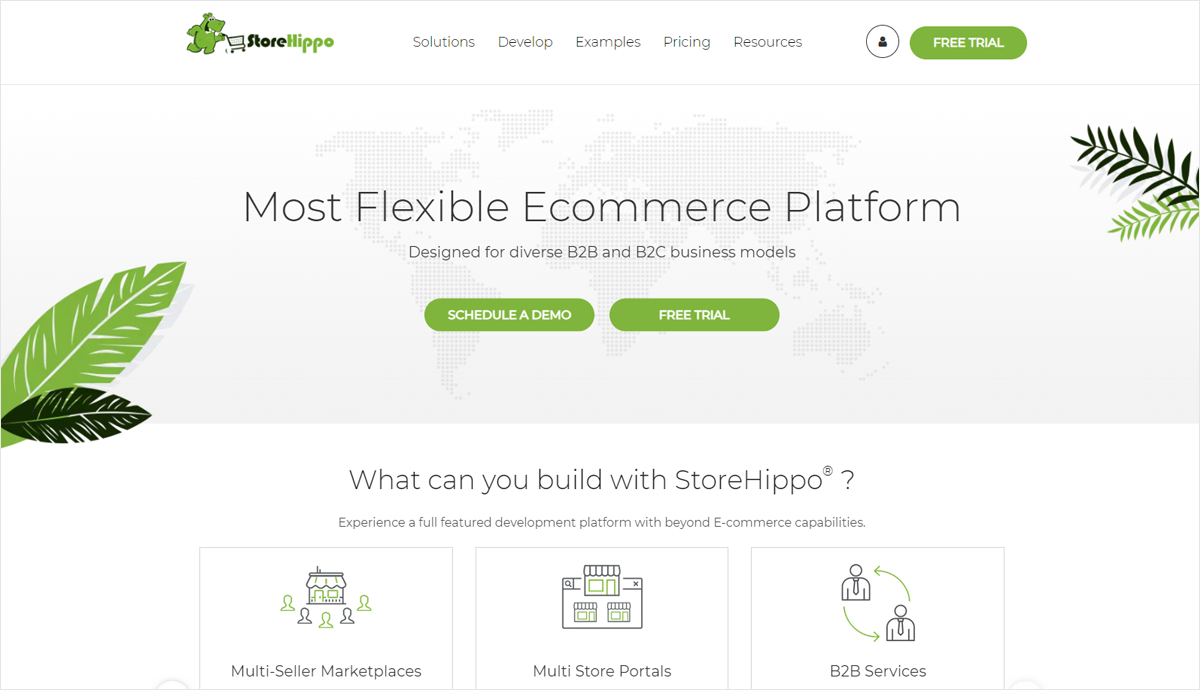
StoreHippo makes to the top of the list of B2B ecommerce platforms because of its cutting-edge technology ( MACH architecture and decoupled headless solutions) and built-in features to support diverse B2B business models. StoreHippo is a SaaS-based turnkey B2B platform that offers a complete ecosystem for building reliable, flexible and scalable B2B ecommerce solutions.
Pros
Storehippo fully hosted and managed B2B ecommerce software comes with extensive B2B features like differential pricing, RFQ, MOQ, customizable entities and forms, advanced search, personalized discounts (order-based, vendor-based, location-based, device-based etc.) and many other features that help a B2B brand engage its buyers and convert faster.
The mobile-ready StoreHippo B2B ecommerce solutions help brands build their Android and iOS apps right from the admin dashboard. There are also inbuilt apps for vendors, delivery boys, admin(s) and marketplace apps for the customers. To top it all B2B ecommerce websites built on StoreHippo are PWAs.
The scalable and flexible StoreHippo B2B ecommerce website builder can be easily tweaked to build disruptive hybrid business models. Given the inbuilt support for various business models, B2B brands can easily combine two or more business models like multi vendor marketplace, multi store, hyperlocal ecommerce, D2C to build their unique out of box solutions. Its inherent scalability accommodates the growth of fast-growing B2B brands of every scale and size.
StoreHippo helps traditional B2B brands modernize their organizational structure with an easy to use interface that automates processes builds introduces efficiency at every level of the business. StoreHippo comes with advanced security features like free SSL, PCI DSS compliant B2B ecommerce platform, audit logs and custom user roles. StoreHippo also provides white-labelled B2B ecommerce solutions for enterprise brands.
StoreHippo easily integrates with chosen software and service providers for ERP, CRM, accounting, logistics and payments. StoreHippo also comes with its own delivery boy software to help vendors and B2B brands manage their own fleet of delivery agents. StoreHippo powerful tax engine, blog engine, marketing tools etc. help in creating personalized B2B buyer journeys effortlessly.
StoreHippo 300+ inbuilt features, customizable device-optimized themes, 120+ built-in integrations and 300+ API endpoints help enterprise brands build the most innovative B2B ecommerce solutions.
Cons
- Support for advanced B2B models available only with the Business, Enterprise and Platinum plans
- Lacks its own POS system
- Has a gamut of built-in marketing tools but no marketing services included in the package
2. BigCommerce
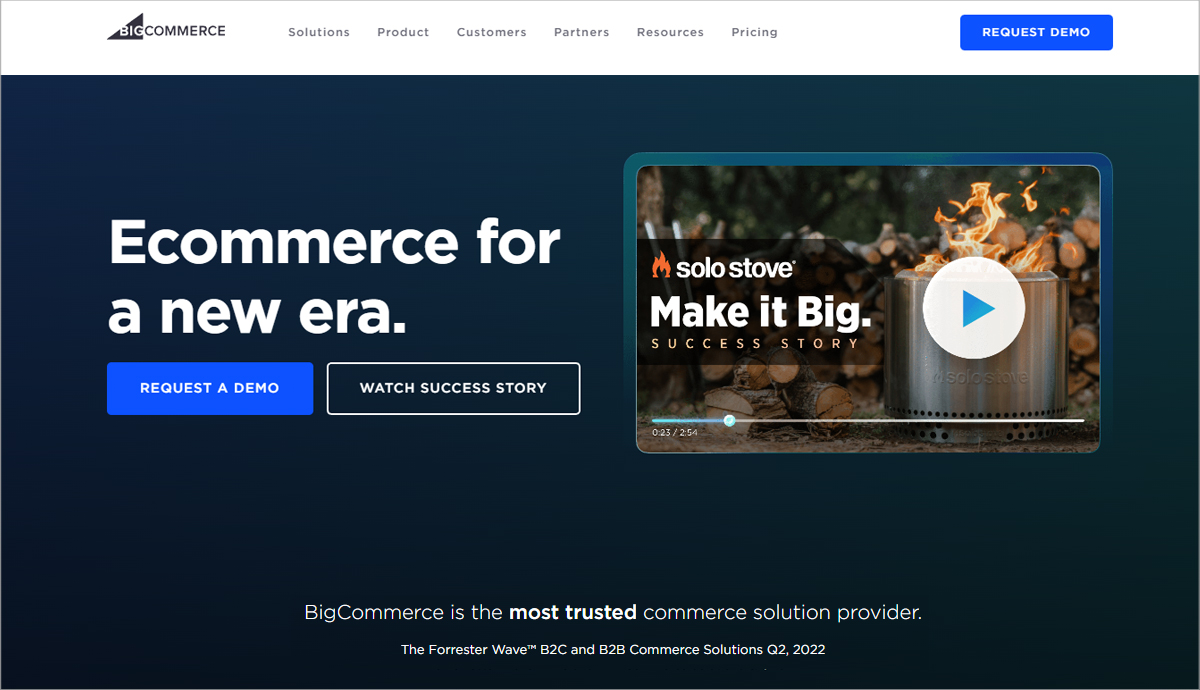
BigCommerce is a SaaS-based B2B ecommerce platform with a rich set of features for B2B brands. It offers easy and hassle-free deployment and powerful APIs which help in building comprehensive B2B solutions for diverse requirements.
Pros
BigCommerce B2B ecommerce software has built-in features like multi pricing, inventory and OMS( order management system), CRM, marketing etc. It is easy to handle large and complex catalogs for wholesale brands easily with BigCommerce. You can also segregate your customers into different groups to allow different levels of access, pricing, discounts etc. to them. BigCommerce B2B ecommerce platform also facilitates building hybrid B2B business models.
Cons
- Customizations to the platform require advanced technical skills and coding knowledge
- The learning curve is steep
- Mobile commerce features leave much for asking given the requirements of modern tech-savvy B2B buyers
- Limited themes and their customizations are time-taking
- Additional paid apps and extensions are needed to implement business models like multi-store, multi-vendor or multilingual etc.
- Limit on annual sales make it a pricy B2B ecommerce platform compared to other players
3. Magento Commerce
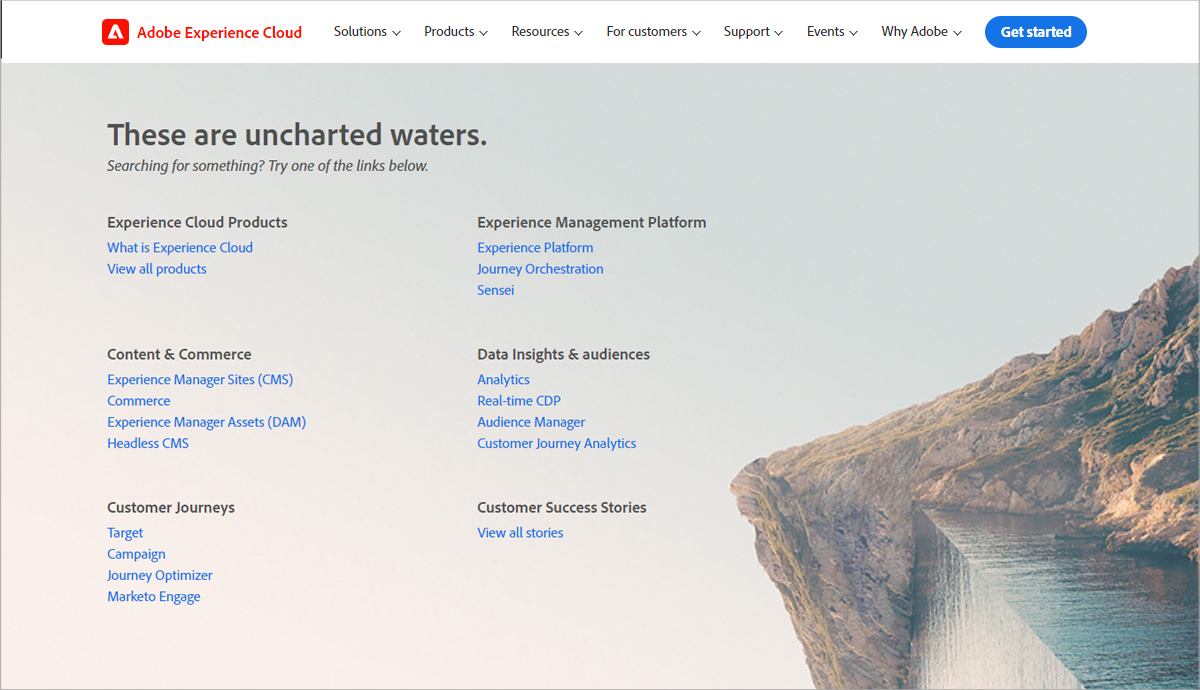
Magento Commerce is designed primarily as an on-premise B2B ecommerce platform for businesses looking for a custom solution. Implementing Magento Commerce solutions for B2B ecommerce requires an experienced IT team.
Pros
With an experienced team of developers, enterprise brands can build a B2B ecommerce software tailored for their unique requirements. Also, they have complete control over this B2B ecommerce software. Magento Commerce comes with a lot of third-party extensions which help in implementing a range of B2B features. An experienced IT team can leverage these B2B-focused features to build a B2B ecommerce website that is at par with any legacy software. Magento also has a large community of developers helping solve issues with the platform.
Cons
- Requires an experienced team of developers to build, manage, maintain and upgrade the B2B ecommerce website
- Some users complain that the platform becomes slow as the business grows
- Magento security breaches are a major issue
- Lacks easy integrations which inflate the costs for small and medium B2B brands
- Mandatory and cumbersome platform migration due to frequent platform upgrades
4. Shopify Plus
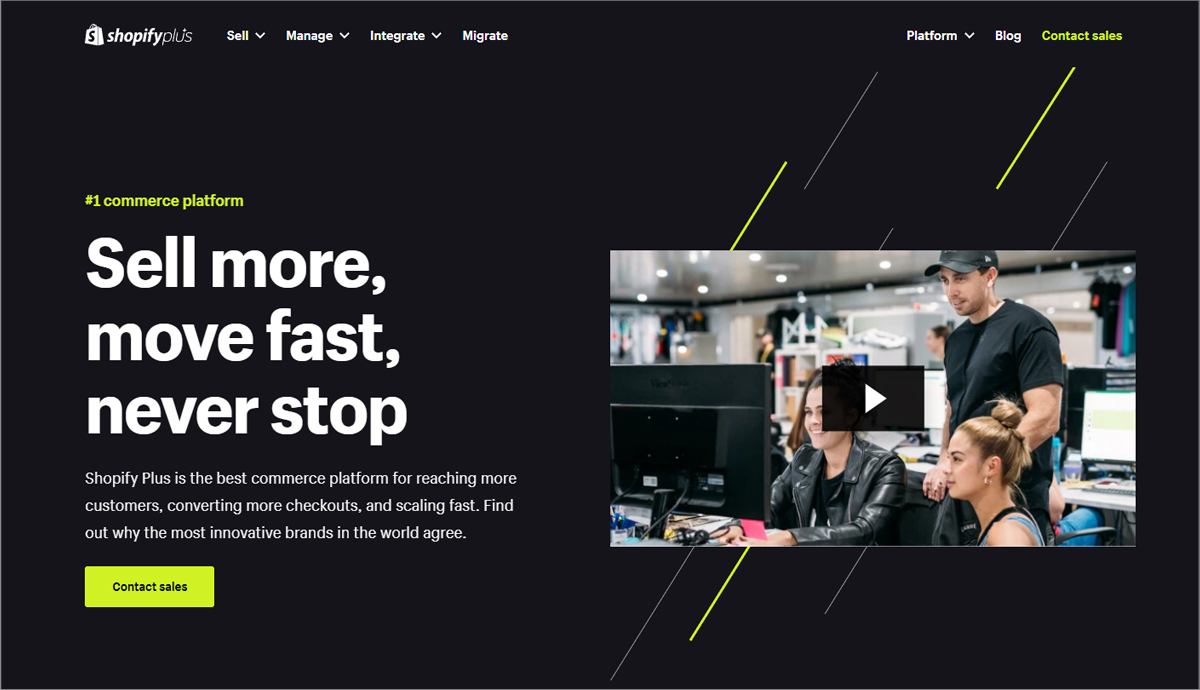
Shopify’s special plan Shopify Plus is designed to offer hosted B2B ecommerce solutions for enterprise B2B brands. through aimed at large B2B businesses. Shopify Plus offers a range of features that helps B2B businesses build, run, maintain and update their B2B ecommerce website as per their unique requirements.
Pros
Shopify Plus’ B2B ecommerce software comes with a host of features like product and inventory management solutions, a fast interface, powerful APIs and analytics solutions. It also has app-based solutions to implement the popular ecommerce models like a multi-vendor marketplace, multilingual B2B website, multi-currency payments etc. Shopify has thousands of apps developed by independent third-party providers to implement various B2B features and functions.
Cons
- Multiple third-party apps need to be synced to build a fully-functional B2B ecommerce solution
- Different paid apps cause the budget to snowball
- The overall architecture of B2B website can become complex and slow due to using lots of apps
- Shopify’s Liquid needs a good understanding and trained developers to implement customizations
5. NetSuite
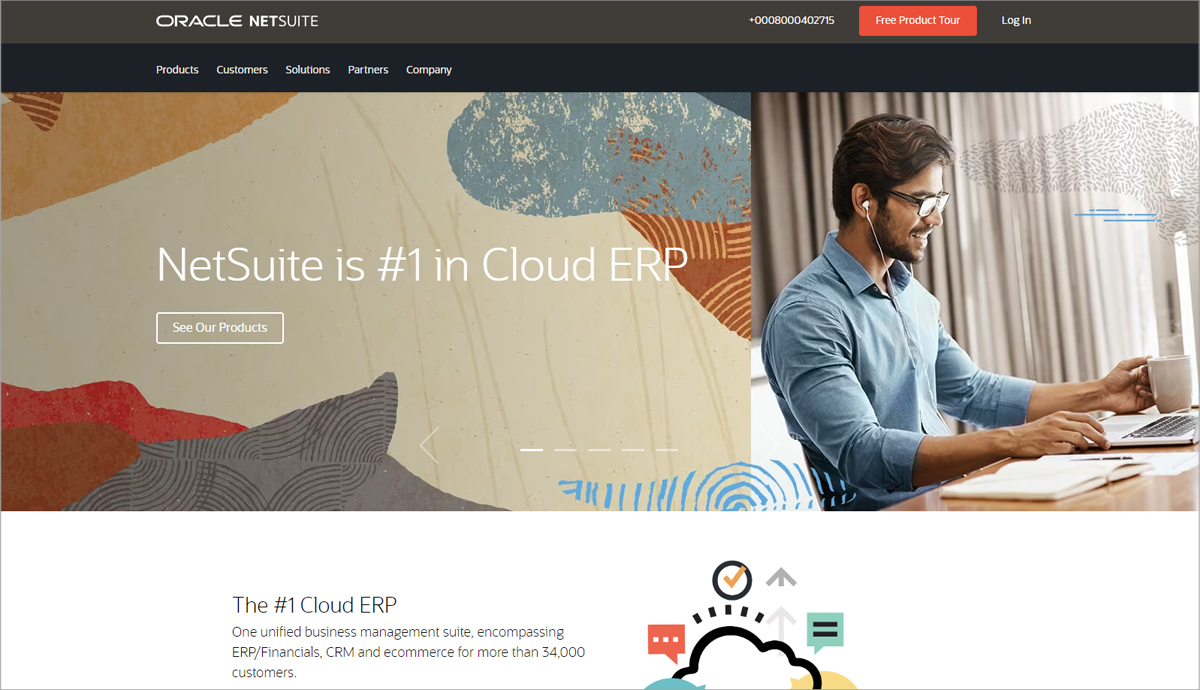
NetSuite by Oracle NetSuite is a is SaaS-based B2B ecommerce platform known for offering reliable and stable solutions. The feature-rich B2B website builder has a good look-and-feel and is well suited for B2B brands that have multi-channel operations like offline as well as digital sales channels.
Pros
NetSuite cloud-based B2B ecommerce solution comes with a variety of features and tools which help in building a multi-channel B2B brand. It automates operations, has inbuilt business intelligence, CRM, inventory, production, reporting, billing tools, and supply management solutions.
NetSuite can also be integrated with different third party software for ERP, accounting etc. and offers support for multiple stores, personalized pricing and other B2B features. NetSuite B2B ecommerce platform can be customized for different requirements of large B2B brands.
Cons
- Steep learning curve
- Scope for automation is limited and the B2B ecommerce platform is more aligned with mid-sized B2B brands rather than enterprise B2B companies
- Cumbersome and limited integrations with third-party software and service providers
6. SAP Commerce Cloud

SAP Hybris B2B ecommerce platform is designed to modernize traditional large enterprise B2B companies. It is customizable and has very good integration capabilities to build unique B2B ecommerce solutions for large wholesale businesses.
Pros
SAP Commerce Cloud offers a comprehensive solution for large B2B brands that run both B2B and D2C models. It also offers multilingual and multi-currency solutions for big brands selling internationally. SAP B2B ecommerce platform integrates well with ERP and marketing services. B2B ecommerce websites powered by SAP Hybris work well across multiple devices. SAP B2B ecommerce platform also offers prebuilt integrations with the help of its SAP integration suite.
Cons
- Suited for large B2B brands with multiple product lines and business reach in multiple geo locations
- Pricey compared to other B2B ecommerce platforms
- Many users complain about the website speed and performance
- Takes some time to understand the B2B ecommerce platform and skilled developers are needed to manage the customizations for the unique needs of B2B brands
- Sourcing agencies with experience in handling SAP commerce cloud B2B ecommerce platform is difficult
- Costly add-ons are needed to explore the benefits of the B2B platform to the fullest
7. IBM Digital Commerce

IBM Digital Commerce is a flexible B2B Ecommerce platform with a great set of features. The scalable platform is well suited for fast-growing B2B brands as it offers a quick turnaround time for building B2B ecommerce websites.
Pros
IBM Digital Commerce B2B ecommerce platform makes it easy for B2B brands to offer personalized services to their clients using payment agreements, contracts and similar documentation. Since the platform automates in real time it makes it easy for B2B brands to streamline the processing and filing of various documents provided by their suppliers and clients. Catalog based filtering feature also helps in showing only those products to different buyer groups for which they are entitled. IBM B2B ecommerce platform also enables multinational B2B brands to make multiple stores for different customer groups and demographics.
Cons
- Requires dedicated technical support team for building the B2B ecommerce solution
- Time-taking integrations with other IBM products
- For a B2B ecommerce platform of its size, the reporting and analytics capabilities are not as expected
- Business tools are difficult to use for non-technical users
- Customizations are cumbersome and require advanced technical knowledge
8. OpenCart
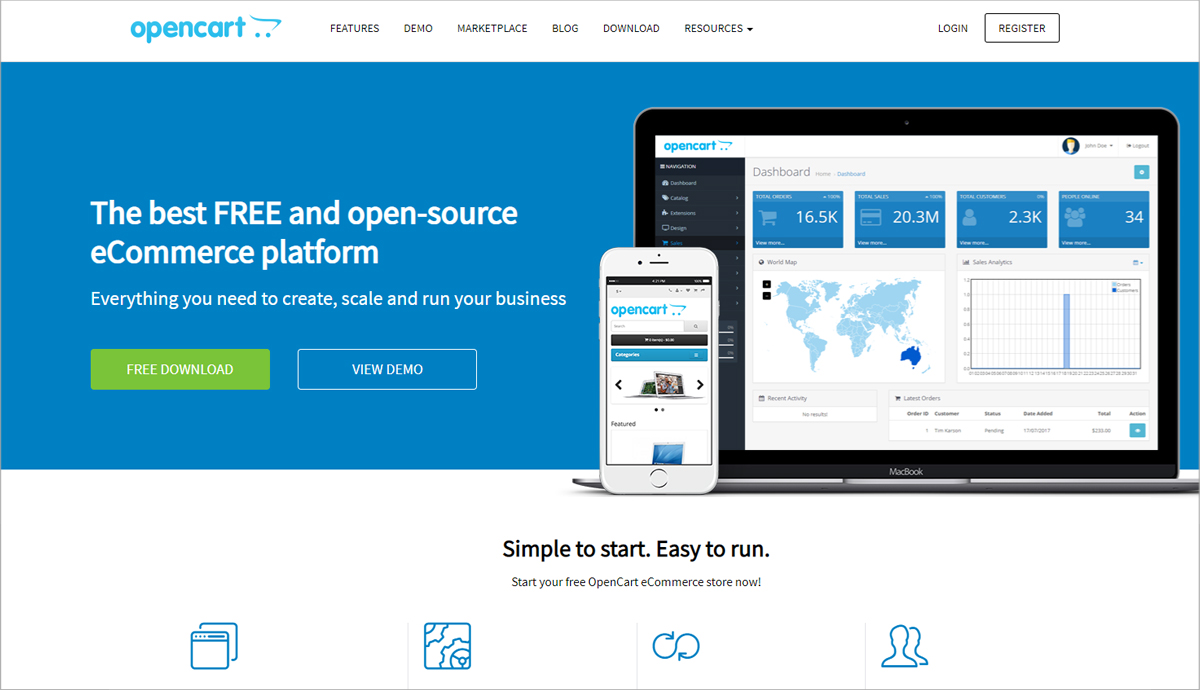
OpenCart offers B2B ecommerce software through its open-source ecommerce platform. The simple to use dashboard has support for B2B marketplaces, multi-store set up based on user groups and locations, multilingual B2B website etc.
Pros
OpenCart is based on open-source and hence free. It is also customizable and has lots of features to manage inventory, SEO, multi-channel marketing, CRM and email marketing. OpenCart B2B solutions also offers a host of extensions and modules that can be leveraged to build customized solutions for B2B ecommerce brands.
Cons
- Difficult to customize without having a dedicated IT team
- B2B functionalities need a lot of fine-tuning and custom work to build a tailor-made B2B ecommerce solution
- Available extensions are buggy with major security concerns
9. 3dcart
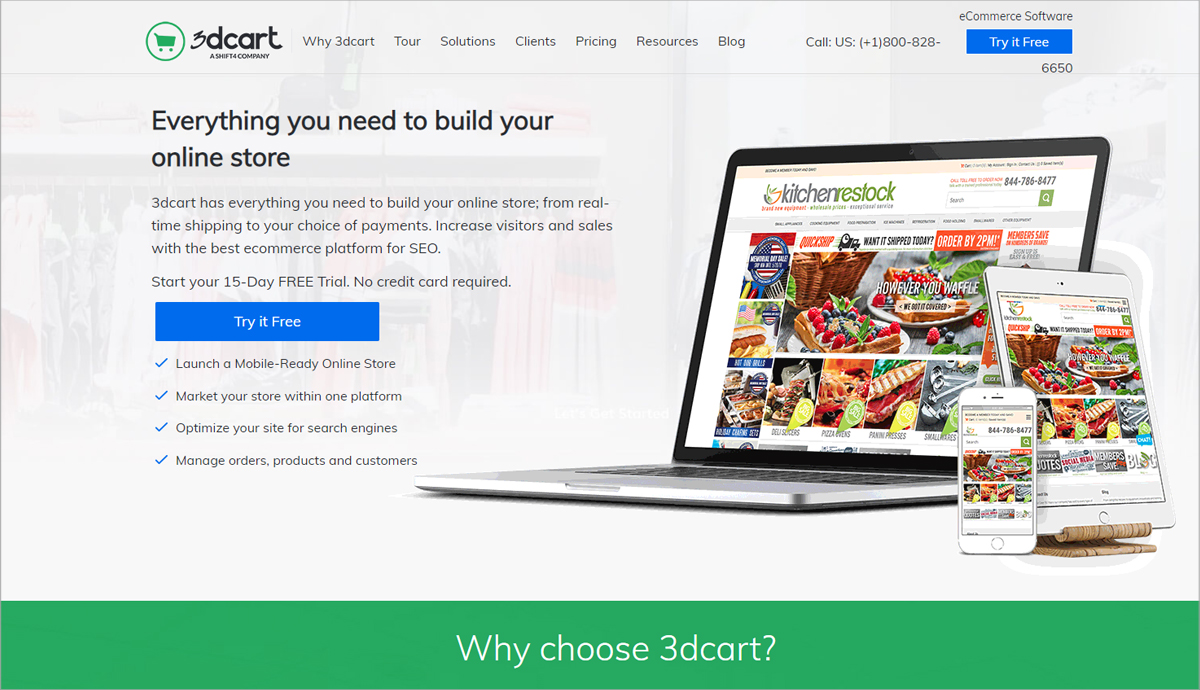
3dcart is a cloud-based B2B ecommerce platform that can be used for building b2B as well as B2C ecommerce solutions. 3dcart offers B2B brands the freedom and flexibility to quickly build and launch their ecommerce website without the need for too much technical skill.
Pros
3dcart offers a feature-rich B2B ecommerce solution for brands. 3dcart B2B ecommerce platform also has 20 different categories of free and paid add ons and integrations through its 3dcart apps store. B2B companies can use these free and paid add ons to build automated solutions for simplifying B2B processes. 3dcart also helps B2B ecommerce stores to connect with various sales channels like Amazon, Walmart, Google Shopping, Facebook Shop etc. 3dcart also offers flexibility with design, payment processing options and selling options.
Cons
- Lacks multiple storefronts feature
- Feature to manage advanced pricing lists is not there
- Limited free theme designs, also theme designs are not as clean as other turnkey B2B ecommerce platforms
- Some users complain that it is difficult to navigate the platform and important features get lost among a huge list of features which are seldom used
- Cost can increase quickly and sharply if you go for paid themes
10. TradeGecko
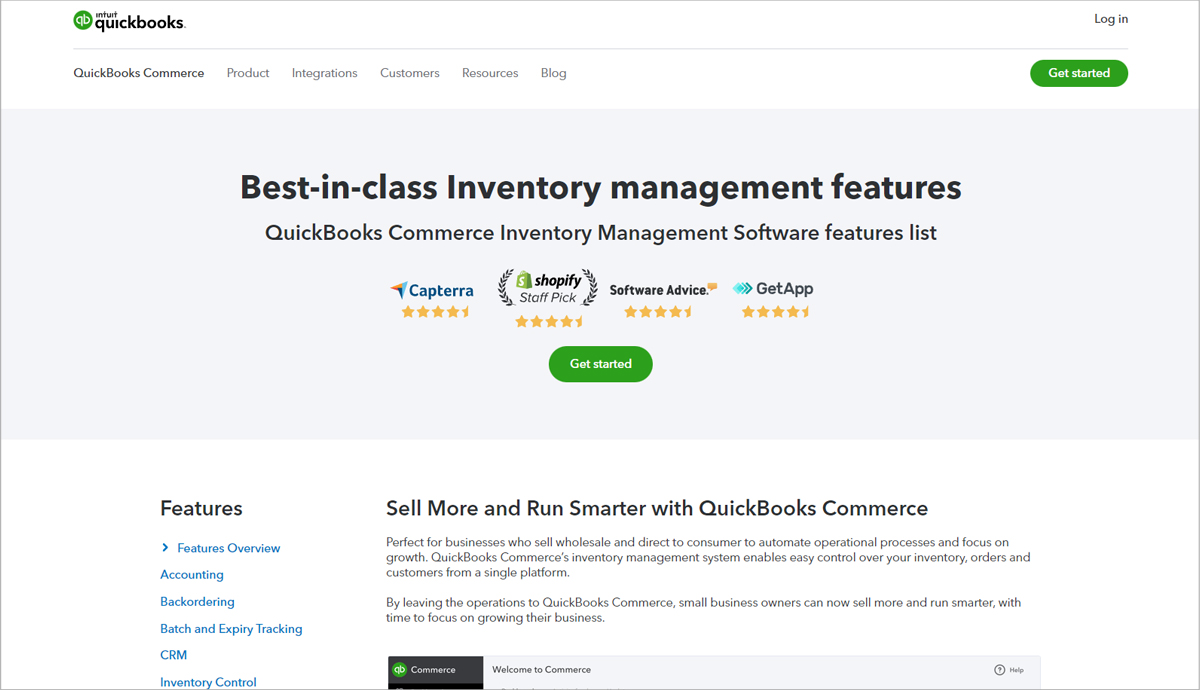
TradeGecko B2B ecommerce software is designed to streamline B2B processes for ordering, inventory and fulfillment. It is a simple B2B solution most suited for small and mid-sized B2B companies.
Pros
TradeGecko streamlines B2B operations by automating transactional processes. It also has features for wholesale supply chain management, reporting and forecasting tools and extensive B2B platform support. TradeGecko also integrates well with Quickbooks, Amazon, Xero etc.
Cons
- Not an ideal B2B ecommerce solution for enterprise brands
- Steep learning curve
- Some customers complain of bugs in the software
- Customer support is not as desired
Conclusion
A B2B ecommerce platform gives a head start to B2B brands planning their online journey. By offering a ready-to-use solution, turnkey B2B ecommerce solutions open up new markets and opportunities for fast growth.
However, choosing the right B2B ecommerce software can be challenging and needs in-depth analysis, lots of detailed information and a host of advanced features and tools that keep your B2B ecommerce brand ahead of trends.
Modern B2B buyers are as demanding as their B2C counterparts so your B2B platform should be powered with cutting edge technology that helps you connect with your buyers on their preferred touchpoints. The best B2B ecommerce platform for your brand would be one that streamlines and automates your processes and offers personalized experiences to your buyers across devices and channels.
To make an informed and well-thought decision about your solution provider do check the features on all the above-listed B2B ecommerce platforms. Begin your shortlisting process right away by booking a free demo with the top one on the list. Start now!
B2B Ecommerce Platform FAQs
1. What are the advantages of using a turnkey B2B ecommerce platform?
A turnkey B2B ecommerce solution has the following advantages:
- Gives you easy-to-implement, battle-tested B2B software for various business scenarios
- Cost-effective solution to get started
- Can get your B2B ecommerce website or B2B marketplace up and running quickly
- Usually does not require an extensive IT set-up to build go online
- Advanced B2B solutions offer periodic upgrades and updates
- B2B solution providers also offer free or paid technical support
- You might get support for marketing tools and other features needed to grow your brand
2. Are free B2B ecommerce platforms better than paid ones?
There are no free B2B ecommerce solutions. Open source B2B ecommerce software comes with a licensing fee and you need to take care of servers, upgrades and maintenance. All of this along with the cost of hiring a dedicated IT team costs quite a substantial amount.
3. Do B2B ecommerce platforms offer different solutions for vendors, distributors and wholesalers?
B2B brands can easily leverage their network of vendors, distributors and wholesalers by using the multi vendor functionality and creating a B2B marketplace. Since the sales processes of each of these parties are interconnected in some way or the other they can be managed well by assigning each vendor/distributor/wholesaler a different admin dashboard where they can handle their orders, inventory, shipping etc. The admin can create multiple levels of vendors and assign custom user roles to permit or restrict given actions on the product catalogues. Even a large group of vendors, wholesalers, distributors and retailers can be easily handled on a B2B marketplace powered by advanced B2B ecommerce platforms.
4. What kind of industries can benefit the most from B2B ecommerce?
Large enterprise businesses belonging to any type of industry vertical can benefit from taking their business online. Since 70% of B2B searches begin online, it becomes imperative for modern B2B brands to connect with their customers across multiple digital touchpoints like B2B ecommerce website, apps, social channels and any other sales channels preferred by their buyers. An advanced omnichannel B2B ecommerce platform like StoreHippo can come in handy for getting started with omnichannel B2B commerce.
5. How long does it take to build a B2B ecommerce website using a turnkey B2B ecommerce solution?
The launch time depends on unique business requirements and the way the business data is already arranged. A B2B online store can be launched in a few weeks or may take a few months depending on the level of customizations and complexity of operations. However, when compared to building a B2B store from scratch, the go-to-market time for a B2B brand a turnkey B2B ecommerce platform is considerably less.
6. Is it possible to create both Business to Business and D2C channels using the same B2B ecommerce platform?
Yes with a technologically advanced B2B solution that has built-in features to support both the B2B and D2C models, you can create different sub-stores to run both your D2C and B2B businesses from the same platform. You can also have a common central admin for both these business models and reach out to retail as well as wholesale clients.
7. Can my vendors integrate their existing software with the B2B online marketplace built for my business?
Yes, if you choose a B2B ecommerce platform that uses a composable commerce model and offers API-based integrations you can easily integrate your existing software and service providers with your B2B marketplace. With a fully-integrated B2b ecommerce solution, you can also quickly add or replace the best-in-breed software.
8. Do B2B brands also need an omnichannel presence?
The new-age B2B clients keep hopping in and out of their favorite sales channels like B2B marketplace website, marketplace apps, checking their favorite brand’s presence on social channels and also going to offline stores if need be. With B2B buyers surfing 4-6 customer touchpoints on average, it becomes imperative for your business to go with B2B ecommerce solutions that come with comprehensive omnichannel solutions.
Also, ensure that adding an additional sales channel does not need a complete backend and frontend overhaul. The business-to-business platform should enable you to use the same backend logis and APIs to create new front ends easily and quickly.
